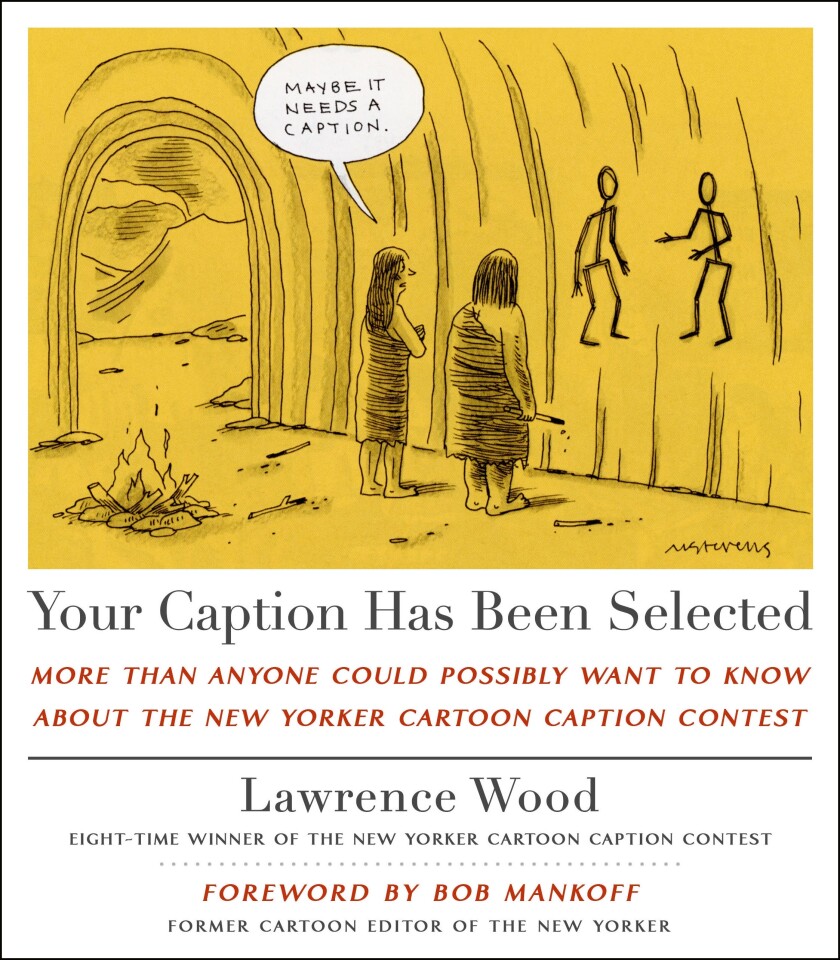As with some magazines that subscribers might guiltily read not just for the articles, many readers of The New Yorker head straight for the cartoons. Especially the page in the back of each issue featuring the Cartoon Caption Contest.
Each contest starts with a single-panel cartoon without a caption. Thousands of readers suggest captions. The following week, three become finalists, with the name and hometown of each appearing in print. And then one wins.
The contest’s most frequently appearing credit, as a winner and finalist, is “Lawrence Wood, Chicago, Ill.,” written in italics under the image and the lauded captions.
Wood, a public interest lawyer, has won the contest eight times and reached the finals seven more. His success inspired his new book “Your Caption Has Been Selected: More Than Anyone Could Possibly Want to Know About The New Yorker Cartoon Caption Contest” (St. Martin’s Press, $33).
Wood, 61, works for Legal Action Chicago, a partner of Legal Aid Chicago. His organization handles class-action litigation, lobbying and other matters Legal Aid Chicago can’t take on because of federal funding restrictions. He’s practiced public interest law for his entire career and has taught housing and poverty law at the University of Chicago Law School.
Every week, he scrutinizes the latest wordless drawing in The New Yorker to come up with something funny. He has entered hundreds of times since the contest went weekly in 2005, even though there’s no prize for success beyond the glory of his name in print — or the seemingly far-fetched reward of a book contract for the all-time champion.
“It’s what I do every Monday morning, and I do it for the love of the game,” he says.
Among the thousands of entries every week, many make minute variations on the same joke. The odds of winning are minuscule, not that that makes it feel better when your brilliant caption doesn’t make the cut.
“I still, for a little while — just a minute every week — I get a little annoyed when I don’t make it to the finalist round,” Wood says.
Bob Mankoff, the retired cartoon editor of The New Yorker, says he has always had an interest in psychology, so he got in touch with Wood to pick his brain about the secrets to his caption preeminence.
“You could see how articulate he was, how diligent he was in this,” Mankoff says. “We’ve had many, many emails about the captioning contest — its failings, what it was good at, crowdsourcing, why this one won rather than that one won.”
Mankoff urged Wood to tell the world about how he does it, telling him: “You were born to write this book, and you should write it.”
“Your Caption Has Been Selected” describes the contest’s history, including that many of the images the contest uses were rejected cartoon submissions to the magazine, stripped of their original captions.
Wood analyzes the original captions, submitted captions that were successful and unsuccessful, and he occasionally kvetches about what wins.
He also indulges in displaying his contest winners. Like the one in which a woman walking past a panhandling dolphin says to her companion: “If he’s so damn intelligent, let him get a job.”
Wood gives advice such as identifying the speaker in each cartoon and tips on creating the optimal caption.
“You’ve got to end on the punch line,” he says. “You have to eliminate every unnecessary word. You’ve got to avoid, at all costs, exclamation points, which I just hate. I am shocked at the number of people who come up with a good joke but don’t know how to tell it.”
Wood spends his workdays wordsmithing, streamlining legal arguments the same way a good caption is boiled down to its humorous essence. Similarly, many other successful caption contestants have verbal jobs, including, as Wood writes, the late Chicago Sun-Times film critic Roger Ebert, another Chicagoan who made it a personal crusade to win the contest, which he finally did in 2011.







